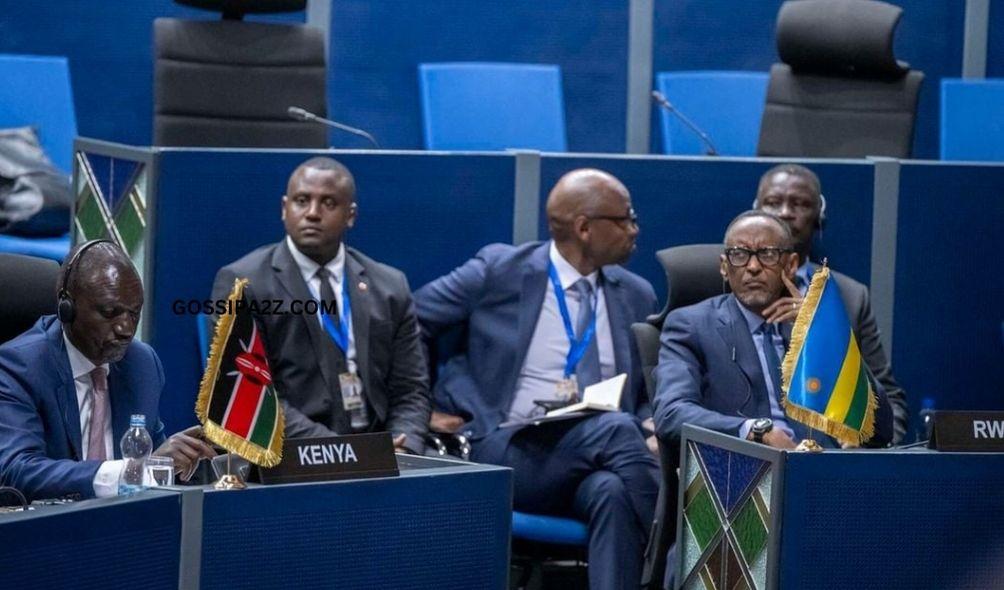Ruto Inherits Kagame Headache to Unite AU Amid Varied Interests
Kenya’s President William Ruto’s ambitions to introduce his reform proposals to the African Union (AU) may have gained momentum last week when he received endorsement from his peers to potentially succeed Rwandan President Paul Kagame, who has held the role since 2016.
However, it could also pose a fresh challenge for a man who has endeavored to push through his economic proposals in his own country, facing criticism and legal obstacles as a result.
Following the conclusion of the 37th Ordinary Session of the African Union Assembly, President Paul Kagame delivered his last report on AU reforms and recommended Ruto as his successor. His peers supported this proposal.
Kagame’s initiatives led to the establishment of the Africa Peace Fund, which has raised approximately $400 million and persuaded the United Nations Security Council to authorize UN funding for three-quarters of AU peacekeeping missions, marking a significant milestone.
Since assuming office in 2022, Ruto has consistently addressed AU reforms, even offering some contentious proposals right from the start.
As an example, he contended that African leaders should relinquish certain authorities to the African Union, thereby enabling the continental organization to engage in negotiations for certain agreements on behalf of its member nations.
Global security
“Member states must consider donating power to AU on matters trade, regional and global security as well as other areas that Africa can benefit from engaging together rather than individually,” he said in his speech in June last year in Zambia, during a meeting of the Common Market for East and Southern Africa (Comesa), a regional trading bloc of 14 member countries mainly in the east, central and southern regions of Africa but also includes Egypt and Tunisia in the north.
“We should merge the position of chair of the AU Summit and that of the AU Commission into one to give it sufficient leverage to engage on behalf of Africa,” he added.
President Paul Kagame’s proposed reforms also aimed to consolidate certain departments to ensure they were appropriately structured for their intended purposes.
The AU has combined its political affairs and peace and security departments, as well as merged health and social issues departments.
However, Ruto’s suggestion to transfer these powers to the AU Commission has the potential to be transformative, akin to the European Union model, where trade and global security policies are typically negotiated collectively. For instance, the EU engages in trade negotiations with the East African Community and also has a leader responsible for foreign policy and security matters.
ALSO READ:
- Gachagua Fires Back at Ruto’s ‘Complaints’ Over Opposition Party Launch- “Where Did You Get 4 Hours To Listen To Us?
- How IEBC Employees Used Fake KCSE & Degree Certificates to Make Ksh35 Million
- Govt Issues Stern Warning to Gachagua in Strongly-Worded Letter
- Raila to Rule from the Shadows? Senator Claims ODM Leader Will Be More Powerful Than Ruto
- Was Natembeya Fleeing for His Life as Angry Mob Turned Hostile at MP Malulu Injendi’s Home?
Each nation maintains its foreign ministers, despite the EU frequently coordinating member states towards unified stances. In contrast, the AU has faced difficulties in establishing a cohesive stance on various matters.
Kagame, in his final report, said there is a need to “clarify the role of the Chairperson of the AU about the Chairperson of the Commission. This has become more important as we work out how Africa will be represented at the G20 and similar gatherings.”
The conclusive ‘Decisions’ from the Summit are anticipated in the coming weeks. However, there may be a discussion within the bloc regarding the representation of the continent at the G20 meetings, especially since the AU gained admission to the group last year.
The Rwandan leader did admit there are varied interests among member states, saying “Africa is not a monolith”.
“Member states will always have differing views. We should not pretend these differences do not exist but should focus on finding a middle ground.”
Frustrations
However, even he experienced frustration occasionally. For instance, at AU, there’s a longstanding custom of slow decision-making and meetings filled with lengthy discussions that aren’t immediately relevant.
During the recent Assembly session, the AU prioritized discussions on education, science, innovation, and technology, despite the pressing issues of security, peace, and stability, which encompassed ongoing conflicts in Sudan and the Democratic Republic of Congo.
“Decisions taken at the level of Heads of State continue to be revisited and revised, or even resisted, by some members of the Permanent Representatives Committee, which should really be unacceptable,” Kagame said.
“We even see parallel structures created, whose main purpose seems to be to frustrate and delay the reforms which the Heads of State have suggested and put in place.”
Moving ahead, the AU needs to finalize reforms, such as delineating cooperation between regional blocs and the continental entity, specifying the functions of the Pan-African Parliament and the African Court of Justice, and ensuring that past issues like corruption and overlapping responsibilities are avoided.
Ruto Inherits Kagame Headache to Unite AU Amid Varied Interests
